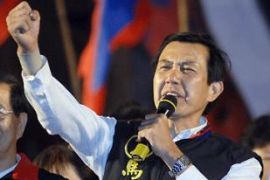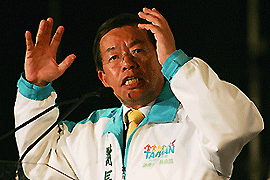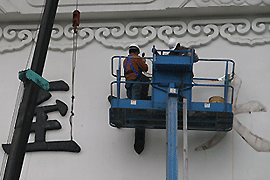Taiwan votes in identity crisis
Taiwanese or Chinese? The big question colouring Taiwan’s presidential polls.

There is a chance, however, that unrest in Tibet may nudge voters towards Frank Hsieh.
Hsieh, the candidate from the ruling Democratic Progressive Party (DPP), has used the final days of campaigning to ram home the message that Taiwan could suffer the same fate as Tibet if the KMT wins power.
Crackdown
| Taiwan candidates | ||
|
Frank Hsieh
|
Propelled into politics after working as a defence lawyer for political dissidents in 1980
Focused campaign on environmental issues, the poor and Taiwan‘s identity
Has backed cautious opening of Taiwan-China economic links and hopes eventually to accelerate moves to make Taiwan a country distinct from China
Ma Ying-jeou
 |
Candidate for nationalist Kuomintang (KMT) party
Unseated Chen Shui-bian, the current president, as mayor of Taipei in 1998
Focused campaign on reviving Taiwan‘s economy by introducing common market with mainland China
Has advocated improving relations with China, signing a peace treaty and halting Taiwan‘s push for independence
Nervous of the enduring cross-strait threat from the mainland, many Taiwanese sympathise with the plight of Tibetan protestors and their opposition to rule by Beijing.
As a result, while pushing for enhanced ties with China, Ma has been careful not to be seen as too pro-Beijing on China‘s Tibet crackdown.
“Tibet reminded us of what happened in 1989 in Tiananmen Square. So I think that what they did, I think is not only unwise, but actually stupid,” he told a recent rally.
The issue of mainland China looms large in Taiwan‘s elections, as it does in all aspects of Taiwanese people’s lives.
China‘s growing deployment of missiles along its coastline facing Taiwan – presently thought to number more than 1,000 – means the identity issue is far more serious than mere Taiwanese introspection.
Beijing has claimed Taiwan as its territory since nationalist Kuomintang (KMT) forces fled to the island from in 1949 following the communist victory in the civil war.
Although sharing a common culture, the open and democratic nature of Taiwan‘s society means its people are feeling increasingly less affinity with the mainland.
|
|
| The DPP’s Hsieh has warned of the dangers of getting too close to Beijing [GALLO/GETTY] |
Capitalising on this, Chen Shui-bian, the outgoing president, has been pushing residents to see themselves first and foremost as Taiwanese.
Since coming to power in 2000, Chen has led a divisive hearts and minds campaign to encourage people to feel more proud of things Taiwanese.
His government has introduced an education policy that teaches history, geography, and culture from a Taiwanese perspective and has promoted the use of Fujianese and Hakka, Chinese language dialects commonly used in Taiwan.
Chen’s campaign has been tapping into a vein of growing pride among Taiwanese people.
A recent survey found 44 per cent of Taiwan‘s voters identified themselves as Taiwanese rather than Chinese.
His moves to reshape Taiwan, however, has also stirred up domestic debate, signified by the uproar in some quarters over the renaming of Taipei‘s Chiang Kai-shek Memorial Hall.
Earlier this year the prominent monument to Chiang Kai-shek was remodelled to become the National Taiwan Democracy Memorial Hall, icluding memorials to social ills during the legendary KMT general’s dictatorial rule.
While Chiang’s harsh and often bloody policies marred his early rule in Taiwan, many still revere him as a founding father who saved Taiwan from a communist takeover.
Trouble with China
|
|
|
Chen Shui-bian’s drive to remodel Taiwan has |
But it is Chen’s stormy relationship with China that appears to have most weakened support for the DPP.
Beijing suspects that Chen’s campaign of promoting Taiwan‘s cultural identity represents a drive for independence through stealth. Cross-strait ties have remained in deep freeze during his presidency.
Chen has turned down Beijing‘s offer of a cross-Taiwan Strait peace accord under the “one-China” framework, dismissing the idea as part of a scheme by China to downgrade and annex Taiwan.
Hsieh, carrying the DPP’s hopes in Saturday’s election, had made a marked departure from Chen’s antagonistic stance towards China.
On Friday, the former human rights lawyer said if elected he would resume dialogue with Beijing, arguing that the time has come for cross-strait compromise.
He has promised to negotiate direct air links with China and open up Taiwan to mainland tourists, following negligible progress in these areas during Chen’s term.
His move echoes frontrunner Ma’s strong campaign calling for improved economic ties with the mainland.
The KMT candidate, a Harvard-trained lawyer and former mayor of Taipei, has proposed forging an unprecedented European Union-style common market between Taiwan and China.
Ma insists that improved cross-strait ties are necessary for Taiwan to ramp up its slugglish economy.
During the past few years, Taiwan‘s economic performance has lagged in comparison with a number of its “little dragon” peers, including Singapore and Hong Kong.
If elected president, Ma has promised annual growth rates of six percent, similar to annual figures during the decade before the DPP took power, and up from the currently estimated rate of 4.5 percent.
Calls by both candidates for improved cross-strait ties follow signs that many inside and outside of Taiwan are tired of Chen’s abrasive politics.
‘Sovreign states’
A referendum backed by Chen that would authorise seeking UN membership as “Taiwan” rather than under the island’s legal name, Republic of China, has irked both China and the US, Taiwan’s most powerful ally.
Chen has called on the electorate to vote on two referendums supporting Taiwan‘s entry into the United Nations.
He says the poll is is necessary to show the world that Taiwanese object to China‘s suppression of Taiwan‘s right to participate in the international community.
“We should speak out loud and tell the international community that Taiwan and the People’s Republic of China are two sovereign states independent of each other,” he said recently, arguing that “Taiwan’s future should be determined by Taiwan’s 23 million people.”
Chen’s remarks were made in an apparent attempt to prevent a possible failure of the referendums, which require the participation of at least 50 per cent, or 8.7 million, of the electorate and the support of more than 50 per cent of participating voters in order to be passed.
The referendums were initiated respectively by the DPP and the KMT.
The DPP’s version advocates joining the UN under the name Taiwan, while the KMT’s initiative calls for regaining UN membership under the country’s official title, the Republic of China, or any other “pragmatic” name.
Unlike the DPP, which is urging the electorate to support both referendums, the KMT is calling for a boycott of the DPP-backed referendum, a move seen likely to increase the chances of failure of both.
The irony of the referendum issue is that whichever way the vote goes, China’s veto-wielding power at the UN means Taiwan‘s entry into the global body is little more than a pipe dream.


